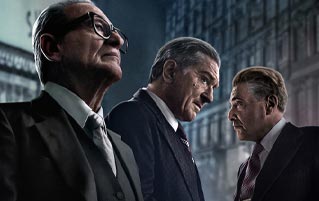5 'Based-On-A-True Story' Movies (That Are BS)

It's nearly time for the Academy Awards ceremony. Yes, we will all celebrate the greatest cinematic achievements of 2019, and also Joker. Not surprisingly, a lot of this year's nominees are based on true stories. But because real life is kind of boring (not to mention filled with unnecessarily gross bathroom scenes), these movies often alter the truth in ways you probably didn't know about. Such as how ...
The Irishman-- There's No Evidence That Frank Sheeran Killed A Single Person
The Irishman is Martin Scorsese's acclaimed Netflix epic about mobsters who walk like haggard senior citizens but have the youthful faces of Pixar characters. The movie tells the story of real guy Frank Sheeran, a truck driver who becomes a hitman for the mob. At the climax, Frank murders his friend Jimmy Hoffa in an intense, upsetting scene which most people probably watched on their phones while on a treadmill at the gym.

The movie incorporates plenty of real-world events and public figures from the '50s through the '80s, and is based on Charles Brandt's biography of Sheeran, I Heard You Paint Houses. But some are doubtful as to the story's authenticity. Not only are a lot of people skeptical of the idea that Sheeran killed Hoffa, but it's also questionable whether he ever killed anyone.
Charles Brandt was a "medical malpractice lawyer" who helped Sheeran get early parole "due to poor health." According to his book, Sheeran unburdened himself to the lawyer, confessing his role as the man behind "some of the biggest mafia murders of all time." Which you have to imagine surprised anyone who bought the book expecting a nice story about home renovation.

But no one else has ever accused Sheeran of killing anyone. Experts suspect that if Sheeran was involved in Hoffa's death, it was likely as a "bit player." And Sheeran himself denied involvement in Hoffa's disappearance back in 1995. Even when he was twice indicted in the murder of "union rivals," the government accused Sheeran of hiring hitmen, not carrying out the deeds himself. And an FBI expert said the idea that Sheeran was the one who bumped off Joey Gallo (another infamously unsolved case) was "crazy."
Also casting doubt on the book is its far-out claim that Sheeran helped out with the Kennedy assassination (this is only hinted at in the movie). And Brandt's book deal was almost torpedoed by the publisher after it was discovered that a letter Sheeran claimed was from Hoffa turned out to be a "laughable forgery." Still, a murder-filled overview of American labor and organized crime is far more exciting than watching a retiree fabricate documents.
Related: 5 Real People Screwed By 'True-Story' Movies Based On Them
Harriet-- Um, Harriet Tubman Didn't Have Magic Powers, And Wasn't Saved By Her Onetime Slaver
Harriet Tubman was a goddamn hero. That's obviously not up for debate. But she wasn't a superhero. Presumably because Avengers movies rake in more money than biopics, the recent film Harriet literally gives Tubman superpowers. In certain scenes, she receives visions from God that allow her to see the future and detect when enemies are nearby. If you think we're exaggerating, the director actually referred to it as Tubman's "Spidey Sense."



While Tubman did claim to experience visions, she had suffered a "traumatic head injury" in her youth, and historians believe she had "narcolepsy, epilepsy, or both." So representing it as a straight-up supernatural ability akin to a teenager who can tell when a dude in a rubber goblin mask is about to attack seems kind of messed up.
Speaking of messed up, let's talk about Gideon. He's the son of Tubman's slaver who grows up alongside her and then becomes obsessed with recapturing her after she escapes, evolving into her nemesis of sorts. Yeah, he didn't exist. He hires a black bounty hunter named Bigger Long to help track her down. Long also didn't exist, meaning the screenwriters came up with the name "Bigger Long" and then decided never to change it. In the final confrontation, Gideon actually kills Long to prevent him from killing Tubman.



This was decried as a "white savior" moment, although it's really more of an "Only I am allowed to kill you" situation. Still, it's a weird look for a Harriet Tubman movie. Predictably, when word of this scene hit Twitter, it stirred controversy, prompting the #NotMyHarriet hashtag.
Related: 7 Movies Based On A True Story (Are Shockingly Full Of Crap)
Ford v Ferrari-- Ken Miles Lost The Big Race Before He Won It
Also known as 2 1/2 Hours You Can Spend Bonding With Your Dad Without Actually Talking, Ford v Ferrari is the story of how two men helped a giant corporation defeat another giant corporation with a really fast car. But despite the fact that it's about two real dudes, a lot of the story was changed so you wouldn't get bored and wander into a screening of Cats. Take the first race, in which Ken Miles (Christian Bale) drives for car designer Caroll Shelby (Matt Damon) at Willow Springs Raceway. Miles throws a literal wrench into the works.

Yeah, that race never actually happened. Later, after Ford hires the pair to win the prestigious 24-hour Le Mans race, Miles is fired for being a loose cannon and replaced with a new driver who embarrassingly loses the 1964 race, paving the way for Miles' triumphant return. First he wins Daytona in 1965. But unlike the exciting race in the movie, in which Miles is held back by Ford suits until the very last minute, the real race wasn't exactly a nail-biter. The Ford car won by five laps! And Miles wasn't even driving when it crossed the finish line; his co-driver was.
While the movie shows the team going straight from the 1965 Daytona win to the climactic 1966 Le Mans race, they totally leapfrog over the 1965 Le Mans. Why? It would have been kind of a mood killer, because Miles did participate in the race, but didn't even finish. And stuff like Ford's dislike of Miles, or Shelby putting his company on the line to back his friend? All that was made up too. We should probably double-check that there's actually a car company named "Ferrari." Sounds fake.
Related: 24 Movies Based On A True Story (That Are Full Of Shit)
Bombshell -- There Were No Secretly Liberal Fox News Producers
Bombshell tells the story of three women at Fox News taking on serial harasser Roger Ailes, played by John Lithgow in so much heavy makeup that it sometimes feels as though you're watching a pervy white remake of The Klumps.

The movie opens with text informing us that the movie is a "dramatization" of real events, and that "characters have been created for dramatic purposes." Such is the case with Margot Robbie's Kayla, who is a composite of several women's stories. There's also Kate McKinnon as Jess Carr, a producer for Bill O'Reilly's show who is both secretly gay and a closeted liberal. While she is a composite of real-life staffers, "no one of her specific profile ... was part of any of the reporting surrounding the Ailes scandal."

Almost immediately, Kayla and Jess hook up. That too was invented for the movie. There was no "secret lesbian tryst between an Ailes victim and a veteran producer." It's pretty clear that McKinnon's fictional progressive was contrived as a way to help non-conservative audiences sympathize with Fox News people. It's Jess who calls O'Reilly and Rush Limbaugh "GOP hacks" and defines the Fox brand by telling Kayla to "Ask yourself what would scare my grandmother, or piss off my grandfather?" More problematically, it's also Jess who helps audiences look past Megyn Kelly's history of racism, humorously dismissing it by telling Kayla "We don't love Megyn Kelly because she thinks Santa's white; we love her because she says it."
A Beautiful Day In The Neighborhood-- Almost None Of It Happened
A Beautiful Day In The Neighborhood tells the touching story of how jaded reporter Lloyd Vogel learns to deal with his anger issues and mend his relationship with his estranged father after being assigned to profile iconic children's entertainer (and all-around superhuman) Fred Rogers. But despite the fact that the movie is "based on the true story of a real-life friendship," it turns out Vogel is as real as Daniel Tiger, King Friday, or the unfortunately named Mr. McFeely.
Mr. Rogers was the subject of an Esquire profile, but it was written by journalist Tom Junod. And while he did become friends with Rogers, pretty much all the rest of the movie is made up. Junod never fought with his dad at his sister's wedding (his sister never even married), Mr. Rogers never visited his dying father, nor did his wife develop a friendship with Mr. Rogers over the phone (they never spoke). And unlike Vogel, Junod didn't have a newborn baby at the time. The couple later adopted a child, but that was thanks in part to the encouragement of Mr. Rogers.
Vogel and Rogers' fictional dynamic exists to illustrate that Rogers' lessons about kindness and forgiveness can be just as important for adults as kids. But as great a movie as it is, they weirdly omit some of the best parts from the real Esquire profile. For example, the original piece opens with Mr. Rogers getting naked in a changing room, quipping to Junod that he's getting a "deeper glimpse" into his life than most others. Or how about the moment when Rogers takes Junod to a graveyard to visit the deceased members of his family, then takes a whiz in said graveyard -- or as Junod puts it, "a proud piss in his corner of heaven." We'd like the "frontal nudity and public urination" cut, please.
You (yes, you) should follow JM onTwitter!
For more, check out The Awful Truth About Movies 'Based On A True Story' - Today's Topic:
Follow us on Facebook. And we'll follow you everywhere.